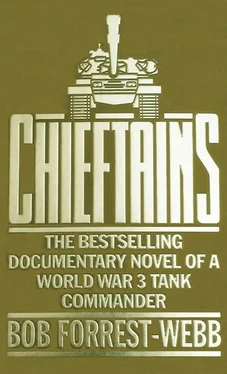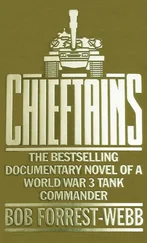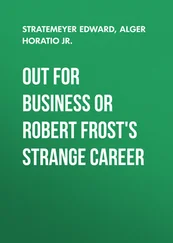‘Load Sabot,’ ordered Davis.
There was a heavy clank of metal from the vertically sliding breech-block as Shadwell reloaded, and a mist of cordite smoke swirled inside the hull; most of the fumes were exhausted outside the tank, but some always drifted back. Shadwell shouted: ‘Loaded.’ He made certain he was well clear of the gun before he did so. Gunners could get a shot off fast if they had a target and to be caught-out standing behind the gun was a sure way to die as the recoil hurled it backwards. It was only one of several ways a loader could come to grief; more commonly they managed to get themselves caught in the traverse, getting a leg or foot trapped behind the charge bins as the gunner or commander swung the turret.
‘Shit!’ Inkester swore, not at Shadwell but because the burst of the Chieftain’s 120mm shell was ahead and to the right of the Soviet T-72. As he brought the sight onto it again, he suddenly realized with horror that he was staring right down the black muzzle of the T-72’s gun. Through his sight’s magnification the T-72 seemed little more than two hundred meters away. There was a burst of flame from the barrel of its 125mm, and Inkester instinctively ducked instead of firing.
‘Inkester! What the hell?’ shouted Davis. There was an explosion on the slope forty meters to the rear of the Chieftain. Davis didn’t see it, but he felt the ground shake and the violent thud of the pressure wave against Bravo Two’s hull. The shell must have passed within centimeters of his turret… his head. He felt sick.
Inkester’s sight picked up the T-72 again, and again the Chieftain’s gun roared. This time vision was better as Bravo Two settled back on her suspension. The T-72 had begun to jink once the driver had realized he was under fire.
Davis seemed to wait forever, until he decided Inkester must have missed again or the shell had failed to explode. Then he saw a brief shower of sparks scatter from the foredeck of the T-72’s hull to the left of the driver’s hatch, and almost at the same time it exploded outwards like a movie scene in slow motion. He saw the two hatches on the turret fly upwards, followed by the turret itself and the driver’s and engine hatches. Soundlessly, to Davis, the hull tore apart, belching a swirling orb of flame. He heard Inkester’s awed voice: ‘My God!’
Davis stared through the lens. ‘50 traverse right… one o’clock. Infantry combat vehicle… a BMP. Pick it up, Inky.’ He felt the turret swing and dropped his eyes back to the sight. ‘Good… good.’ Inkester was silent, concentrating now, just as he would be at Lulworth or Suffield. The range was less than for the T-72 — thirteen hundred meters.
The Chieftain lurched. This time Inkester had fired quickly, but more calmly. The shell struck the BMP just under the thick sloping armour of its bow, and exploded on impact. The vehicle stopped as though it had run into an impenetrable wall. A second later Davis saw the eight infantrymen it had contained, and two of its crew who were apparently unwounded, leap from the vehicle and dive for the shelter of a nearby shell crater. He could see them clearly. Instinctively, he found them in the sight of the 7.62mm machine gun. The Chieftain’s turret was moving again as Inkester sought another target. Davis corrected his aim, adjusting the movement of his cupola to oppose that of the turret. He pressed the firing button and heard the satisfying response from the gun; the bullets tore the lip from the crater in a burst of dust and earth. It was difficult to keep the fire accurate. One of the Soviet infantrymen scrambled from the shell hole and ran to Davis’s right. He didn’t bother to try to follow the man. The bodies he could now see in the crater were motionless.
Inkester had the main sight on another tank, a T-80 which had appeared at the edge of the smoke. Davis anticipated the explosion of the gun, but before Inkester could fire the tank swerved and began belching flame through ventilators and hatches.
‘Blowpipe missile,’ shouted Davis. He could see movement on the lower ground to his left. ‘Some of our infantry. Why the hell don’t they keep us informed?’ There were shell bursts in the trees near the infantry position, and the smoke laid by the enemy artillery was much closer. The noise of the battle had become as great as that of the initial artillery barrage. Davis could hear the crump of mortar shells and feel the ground shivering beneath the Chieftain. It was like standing in a railway tunnel as a ten-coach intercity roared by.
He was about to try to help the infantry with prophylactic fire along the hedges beyond their position, when Inkester shouted again: ‘Traversing right… three o’clock.’ Davis saw movement at the edge of the barrage. Dark hulls in the smoke… the sudden flashes of white flame. Inkester began bringing the turret around.
The bank of earth three meters ahead of Bravo Two was hurled aside. The concussion knocked Davis backwards, his head smashing against the equipment behind him. He heard a second explosion and was thrust forward out of his seat. Someone was screaming… the interior of the Chieftain was pitch-black, the atmosphere thick with the stench of fuel and swirling dust. ‘We’re going to brew up,’ thought Davis. ‘Any second now we’ll go.’ Bravo Two was quivering as though it were alive. He tried to struggle upright, but could find no purchase for his feet. Shadwell was yelling beside him. There was a burst of light above, then a terrifying crash. The Chieftain’s hull echoed… there was excruciating pain in Davis’s ears. Bravo Two rocked as though it were resting on a water-bed, then something seemed to hammer down on the turret with terrible force, twisting the tank sideways, forcing it deep into the earth as though struck by a gigantic fist…
Magpie, the stay-behind-unit of the Royal Tank Regiment, had not suffered from the intense Soviet barrage that preceded their armoured assault. Few of the missiles and shells had landed in the strip of ground that included their underground bunkers, though they had felt the thump of explosions transmitted through the heavy clay to the concrete chambers in which they and their light Scimitar tanks were sealed. The position was shell and bomb proof, and even the heavily camouflaged entrance which was its weakest point was protected by an overhanging shelf of concrete looking, with its natural weathering and subtle design, like nothing more than an outcrop of limestone.
There was a sense of isolation making the men even more nervous. They were now totally cut off from the NATO armies; a small island, encompassed by an ocean. The war had swept past them, friends must have already died, but as yet they had seen none of the action.
Captain Mick Fellows hoped he had transmitted none of his own doubts to their minds. It was bad enough that he himself should be having misgivings about the entire project. And waiting through the long hours until darkness came again, and with it his final instructions from HQ, was making him even edgier.
What the hell was he doing here anyway? Volunteer? They’d said that; made him feel proud about it too, for a while. They had used an insidious form of pressure: ‘Need the best man, Mick… someone reliable, cod-headed… any ideas? Important task. It’ll do your career a bit of good!’
‘Captain Fellows, sir.’ It was Lieutenant Sandy Roxforth, one of his Scimitar commanders, at the observation platform. ‘There’s some movement outside.’
There were two periscopes built into the roof of the bunker, their view covering a full three hundred and sixty degrees around the position. Roxforth had been using the one which covered the area towards the north-east in the direction of the East German border town of Oebisfelde a few kilometers away. Beyond the first chequerboard of fields was the 248 highway following the line of the border. Fellows lowered his head to the periscope and adjusted the focus to suit his eyes. The field of vision was blurred at the edges where grass and small shrubs close to the position interfered with the clarity of the lenses. A pall of smoke drifted in the easterly wind, from the direction of the woods beyond Bahrdorf. The village itself must have come under heavy shelling. Even at this distance, its familiar outline had changed. The bell tower of the church was missing, and many of the buildings looked ragged. The devastated farmland no longer had the prosperous and orderly appearance of the previous day, the surface of the fields heavily scarred by shell, bomb and missile craters, the formerly neat boundaries destroyed and tangled. A grain silo some six hundred meters from the bunker was blazing, and through the periscope’s magnifying lenses Fellows could distinguish the carcasses of a herd of Fresian dairy cows nearby.
Читать дальше












